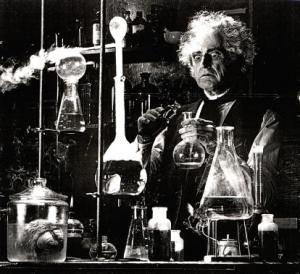Recently my university had an open house event to bring prospective students and their parents onto campus. I volunteered to hang out at the Natural Science Department table with a couple of colleagues from Biology and Chemistry to schmooze. I made a couple of interesting observations that morning.
The first thing I noticed was that most of the students and their parents avoid eye contact with the science profs. I fully admit I’m not much to look at, but come on. I’m not sure why people don’t want to make eye contact with scientists. I try to reserve my steely gaze for the lecture hall, so that can’t be it.
The second thing I noticed when I engaged a couple of the students as they walked by, eyes down, was that many students don’t think they can do science. “Hi, do you have questions about a major in biology,” I ask. “No, I’m no good at science,” many of them would reply. Seriously? I know for a fact students have to pass an end of instruction exam in biology in Oklahoma, so they must be okay at science, at least.
The third thing I noticed was also a reply to my inquiry. Apparently, many students don’t like science. Now, I understand that not everyone want’s to be a science major, but I heard too often students say, “I don’t like science.” Ouch, dude. That’s my bread and butter! I didn’t care much for sociology, but I found sociology to be interesting and relevant. What is it that would make someone say they don’t like a specific discipline?
So, students (and parents) don’t like to make eye contact with scientists, they don’t particularly like science, and they don’t think they are good at science. It sounds to me like Science has a public relations problem.
Too many people have a mistaken, stereotyped view of scientists as people, and science as an avocation. Most people don’t know scientists, personally. As a result their only experiences with science and scientists are based on media  representations. Scientists are often portrayed in one of two ways. 1) messy-haired, wearing a white lab coat, standing next to an array of bubbling glass tubes and beakers or “sciency” electronic apparatus. 2) dorks in comic book character t-shirts spouting physics equations. We might throw in socially awkward and atheist into each of these descriptions, as well.
representations. Scientists are often portrayed in one of two ways. 1) messy-haired, wearing a white lab coat, standing next to an array of bubbling glass tubes and beakers or “sciency” electronic apparatus. 2) dorks in comic book character t-shirts spouting physics equations. We might throw in socially awkward and atheist into each of these descriptions, as well.

Stereotype 2: dorks in comic shirts spouting equations
Add to these mistaken stereotypes, a poor introduction to science in public school. Now, hold on a second. I’m not blaming the teachers, necessarily. No doubt there are great science teachers and crappy science teachers. I blame the bureaucratic nightmare better known as No Child Left Behind.  Teachers, fearful of loosing their jobs because their students don’t perform well on a standardized test, can’t make science fun and interesting because they are “teaching to a test.” Gone are the days when teachers could go off on tangents to teach concepts their students want to run with.
Teachers, fearful of loosing their jobs because their students don’t perform well on a standardized test, can’t make science fun and interesting because they are “teaching to a test.” Gone are the days when teachers could go off on tangents to teach concepts their students want to run with.
A kick-ass public relations blitz is the best hope for changing stereotypes and short comings of our public education system. Scientists need to get out and meet the public head on. Make tv and radio appearances. Go to local schools with their research. Give talks about their research to civic groups and at public venues.
Help teh general public understand who scientists are as a group. Being a scientist, I know how diverse scientists are as a group. Scientists are men and women; gay, straight, and transgendered; catholic, protestant, jewish, muslim, atheist; mothers and fathers; couch potatoes and marathon runners; laid-back cross-county skiers and gnarly snowboarders. If you haven’t gotten it yet, Scientists are people, too!
So, if you are reading this post and you are a scientist, get out there and engage people. Help them understand what you do. It may not be easy sometimes. Make a special effort to pass on your passion for science to kids. They are naturally curious, we need to nurture that curiosity into their teen years. And if you are a non-scientist, get informed. This internet thing is loaded with useful information. Put it to use. Email scientists that are dong work you find interesting, follow a science blog or listen to science podcasts (1, 2, 3). Find out what science is all about. It’s not just test tubes, beakers, and fancy sciency stuff.
And after all of this typing, it turns out I may be wrong. Science has been proven to be hard.








